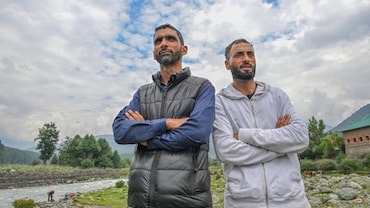- HOME
- /
- True Stories
- /
- Heroes
- /
Lockdown Heroes: A Group In Goa Is Working With Migrants To Help Them Stay Afloat
How one woman brought together a group that not only provided food but also helped workers find jobs during lockdown
 A Covid Outreach Goa volunteer distributing essentials at Pilerne, Goa
A Covid Outreach Goa volunteer distributing essentials at Pilerne, Goa
At the Athletic Stadium in Goa’s Bambolim, it was long past lunchtime and tempers were beginning to fray. The arena temporarily houses hundreds of migrants waiting for trains to take them back home to various parts of India. As the hours pass and the caterer does not show up, the hungry workers start arguing with the police. Amidst the fracas, a lone woman steps forward and speaks with the workers who circle around her, listening intently. She hears their complaints about food and lack of information about trains and explains what she knows, which pacifies them.
The woman—42-year-old artist Miriam Koshy-Sukhija—is a former curator of one of Goa’s premier art galleries. When Goa went into lockdown SOS calls on social media prompted Koshy to organize food packets for senior citizens and stranded tourists. “I thought the relief work would last for about two weeks,” says Koshy. Once she started, however, she found much more to be done. “I couldn’t turn back then,” she says.
An ex-student of a local management school, Koshy heard of 200 people stranded in Betim across the Mandovi river from her alumni group. She got someone to make a list, so they could work out the logistics. Over the next few weeks, Koshy’s home became the main packaging hub. Sacks of grains and pulses still line the walls of her living room. At the height of the operations, the group serviced around 1,200 to 1,500 people every day, using football grounds and other open spaces for deliveries.
They soon set up a website, which brought in donations to cover costs. Now, with relief operations reduced and the action shifting to the Bambolim stadium instead, Koshy and the volunteers are helping coordinate food supplies for thousands of stranded migrants. Koshy also shares information about available government schemes with the workers, helps them with paperwork and submits data on those receiving government aid. “Then, we needed to start enabling the workers to find jobs,” says Koshy.
Koshy, with Savio Henriques, a volunteer from the nearby village of Merces, created an online directory of workers-for-hire called COGOLD (Covid Outreach Goa Online Labour Directory). Residents who needed services filled a form identifying the required skill-sets and their location. A volunteer, then manually checks the database, finds a match and connects them, leaving payments or rates to be worked out individually. “We only want to see them being treated humanely,” says Henriques, a London resident, currently in Goa. “I saw Koshy and her team distributing groceries near my house. The crowd was growing, so I went to help,” he says.
 Volunteers weigh and pack rations before they head for distribution
Volunteers weigh and pack rations before they head for distribution
“People are desperate to go home,” he says, which makes for a fluid database. The few volunteers have to keep verifying that workers are still available. There are around 1,800 to 2,000 people still listed, even after twice that number was removed since they left Goa. On the rolls is Neelima Yadav, 24, who chose to stay behind with her family. Originally from Gorakhpur, she has lived in Goa for eight years. “We have to manage somehow; we can’t go back,” she says. Her husband, Harendra, works in construction but there’s no work at the moment.
When Pooja Rani, co-Founder of Khoj-aao! Adventures, recently moved into a house in Moira village, she needed help with cleaning and was matched with Neelima. “I was very impressed with her,” says Rani. “She had experience and did an amazing job.” The initial work was just a one-off, but Pooja has since called her back once a week.
Neelima is very happy with the prospect of work. “I need money to pay for food and school fees, so this will help. I hope I find more work this way,” she says.
With the help of Koshy and friends, she could get lucky.






